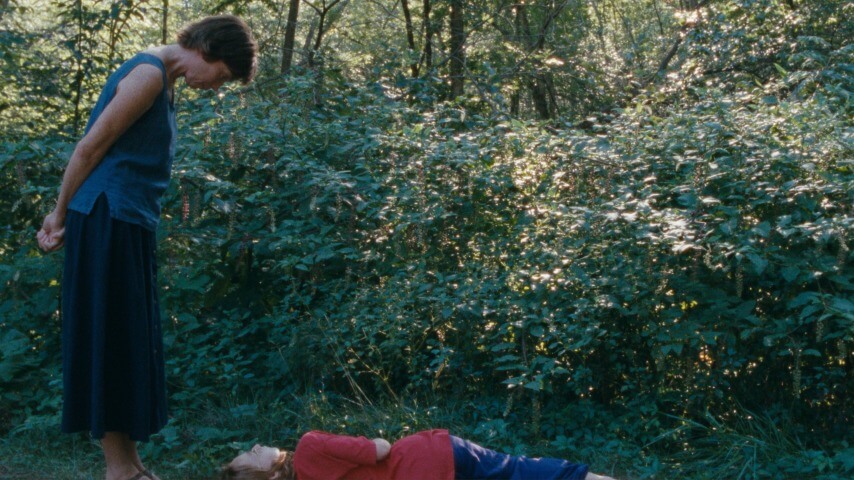Set in Western Massachusetts during the hazy summer of 1991, Janet Planet, the cinematic debut from Pulitzer-winning playwright Annie Baker, exquisitely captures the texture of this time and place through an adolescent gaze. While Baker’s plays involve extended scenes in enclosed spaces, her foray into filmmaking is formally assured, implementing her long-held interest in sharp yet meandering dialogue alongside lush 16mm imagery. Some might find her style to be narratively insipid, but fans of her broader oeuvre will find familiar comfort—and broadened fascination—in the quiet minutiae she transmits to celluloid.
After calling home with deadpan threats of suicide, 11-year-old Lacy (impressive newcomer Zoe Ziegler) adequately convinces her mother, Janet (Julianne Nicholson), to pick her up from what was supposed to be an extended sleepaway camp. Only then does Lacy realize that returning home may not have been the wisest decision, as she’ll need to share space with her mother’s current boyfriend, Wayne (Will Patton). Clearly peeved that the brashly curious child’s presence will mean less one-on-one time with Janet, Wayne begins to experience intense “migraines” that require Lacy to be all but banished from making noise or entering certain rooms in the house. Perhaps this is a rebellion—subconscious or intentional—against the fact that Lacy insists on Janet sleeping with her at night.
While the relationship between Lacy and her mother is peppered with textbook signs of codependency, Janet is all too eager to share her time with a revolving door of lovers, friends, and spiritual counsel, much to her daughter’s ill-concealed frustration. Janet Planet explores three such relationships through loose chapters.
After Wayne is given the boot (“I think you have to break up with him,” Lacy frankly confesses after Janet asks her honest opinion), her old friend Regina (Sophie Okonedo) is invited to stay at the duo’s sun-drenched cabin located amid bucolic forest. A performer in a theater troupe that she insists is not as cultish as it sounds, Regina retreats into Janet’s hospitality as she recuperates from her breakup with the not-cult’s founder. Eventually, Avi (Elias Koteas), the eerily zen leader in question, begins to spend time with Janet, who even adopts newfangled meditative techniques in response to his influence. Lacy watches these interactions play out with familiar suspicion and envy—although she’s used to outsiders being pulled in by her mother’s magnetism, the sting of having to constantly share her attention never dulls.
It’s apt for Lacy to often be on the receiving end of her mother’s emotional prick considering the latter runs an acupuncture practice (which lends the film its name) out of a detached office on their property. For all of the pain relief Janet strives to provide her patients, she can’t quite soothe Lacy’s general anxiety, which largely manifests socially. (“I usually have a hard time making friends,” she admits to Regina during a charming chat in the car.) While Janet may sometimes pull away from her daughter, she does deeply understand Lacy in a way that no one else does. Her parenting approach might lack appropriate boundaries (for example, Lacy is much too privy to her mother’s insecurity and how this impacts her love life), but she always treats her daughter as a fully-formed individual who she will love and support unconditionally. What Janet doesn’t quite grasp, however, is that a child won’t simply start acting like an adult just because they’re treated like one.
Deeply-felt connections that are nonetheless strained by emotional letdowns are also explored in The Flick, the 2013 play that earned Baker her Pulitzer. Centering on three employees at a crumbling movie theater in Worcester, MA, the three-hour production incorporates silence and seemingly inconsequential cinephilic dialogue to deliver a bizarrely entrancing tale of betrayal and entitlement. Janet Planet similarly hones in on would-be mundanity, from Lacy’s solitary walk to and from dreadful piano lessons to Avi’s long-winded spiritual ramblings. Yet Baker is also attuned to how routine environments can become heightened by a child’s rosy perspective—a mall becomes an elaborate playground, a new shampoo at showertime a titillating experiment—compounded here by the magic of summer smog.
Though Janet Planet feels somewhat emblematic of Baker’s existing narrative and thematic interests, it only really works in filmic form. For one, the writer-director isn’t convinced that a young stage actress could accurately imbue Lacy’s deep-seated awkwardness. (“I’m sure there’s an awesome 10-year-old who could be in Matilda…But she wouldn’t be right for the movie,” she said in a recent profile.) Though the absence of dialogue is definitely felt in the film, Janet Planet never feels permeated by silence. In lieu of a traditional soundtrack, Baker and sound designer Paul Hsu spent two weeks recording the ambient sound in remote areas of Western Mass., from the nightly chorus of chirping crickets to resounding birdsong on a bright afternoon. Lacy might spend ample time alone, but she feels ensconced by the natural splendor of her surroundings—much like a mother’s love envelops the soul even when physical separation is necessary, and perhaps even ultimately healthy, as painful as cutting the cord may be.
Baker has made an astonishing film debut while remaining rooted in theater, incorporating thespian performance at several instances. Whether reveling in impressive local productions or Lacy’s miniature stage for a hodgepodge assortment of toys, the vast possibilities inherent to putting on a play are still at the forefront of her mind. Yet Janet Planet allows Baker to flex her cinematic muscles, which extend past The Flick’s cheeky games of association. Few artists can so seamlessly transcend artistic labels, but Annie Baker has proven that she possesses the natural knack for quiet storytelling across mediums.









































